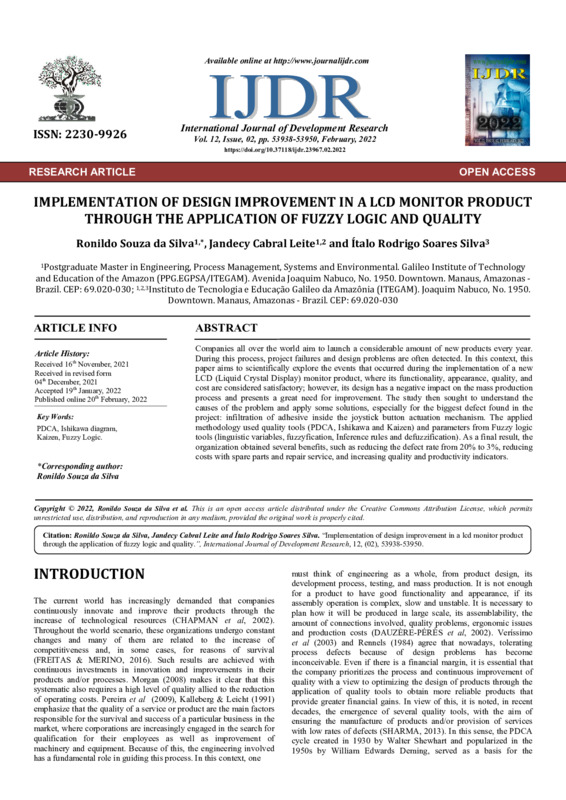IMPLEMENTATION OF DESIGN IMPROVEMENT IN A LCD MONITOR PRODUCT THROUGH THE APPLICATION OF FUZZY LOGIC AND QUALITY
Item
-
Tipo do ITEM
-
Artigo Ciêntifico
-
Título do Artigo
-
IMPLEMENTATION OF DESIGN IMPROVEMENT IN A LCD MONITOR PRODUCT THROUGH THE APPLICATION OF FUZZY LOGIC AND QUALITY
-
Descrição
-
Companies all over the world aim to launch a considerable amount of new products every year.
During this process, project failures and design problems are often detected. In this context, this
paper aims to scientifically explore the events that occurred during the implementation of a new
LCD (Liquid Crystal Display) monitor product, where its functionality, appearance, quality, and
cost are considered satisfactory; however, its design has a negative impact on the mass production
process and presents a great need for improvement. The study then sought to understand the
causes of the problem and apply some solutions, especially for the biggest defect found in the
project: infiltration of adhesive inside the joystick button actuation mechanism. The applied
methodology used quality tools (PDCA, Ishikawa and Kaizen) and parameters from Fuzzy logic
tools (linguistic variables, fuzzyfication, Inference rules and defuzzification). As a final result, the
organization obtained several benefits, such as reducing the defect rate from 20% to 3%, reducing
costs with spare parts and repair service, and increasing quality and productivity indicators.
-
Abstract
-
Companies all over the world aim to launch a considerable amount of new products every year.
During this process, project failures and design problems are often detected. In this context, this
paper aims to scientifically explore the events that occurred during the implementation of a new
LCD (Liquid Crystal Display) monitor product, where its functionality, appearance, quality, and
cost are considered satisfactory; however, its design has a negative impact on the mass production
process and presents a great need for improvement. The study then sought to understand the
causes of the problem and apply some solutions, especially for the biggest defect found in the
project: infiltration of adhesive inside the joystick button actuation mechanism. The applied
methodology used quality tools (PDCA, Ishikawa and Kaizen) and parameters from Fuzzy logic
tools (linguistic variables, fuzzyfication, Inference rules and defuzzification). As a final result, the
organization obtained several benefits, such as reducing the defect rate from 20% to 3%, reducing
costs with spare parts and repair service, and increasing quality and productivity indicators.
-
Língua do arquivo
-
inglês
-
Data da Publicação
-
Ano 2022
-
Palavra-chave
-
PDCA
-
Ishikawa diagram
-
Kaizen
-
Fuzzy Logic
-
Autores
-
Ronildo Souza da Silva
-
Jandecy Cabral Leite
-
Italo Rodrigo Soares Silva
-
Local
-
ITEGAM - Manaus, 2022
-
Áreas de Conhecimento
-
Otimização de Processos Industriais
-
Turma
-
Turma 1


